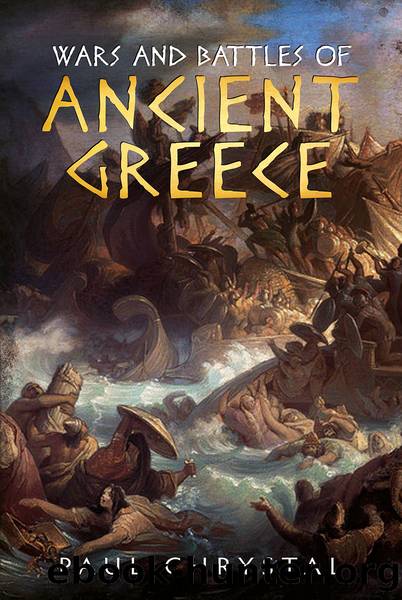Wars and Battles of Ancient Greece by Paul Chrystal

Author:Paul Chrystal
Language: eng
Format: epub
Publisher: Fonthill Media
Published: 2018-05-15T00:00:00+00:00
10
Conflict and Greek Women
If you believed Hector in the Iliad when he asserts that fighting battles was the exclusive preserve of men, you would have to accept that women played no part, directly or indirectly, in the serial warmongering that pervades real world ancient Greek history. Given the subdued profile of women generally in Greek society and their social, civic, and political unobtrusiveness that was thereby fostered, it may come as some surprise to learn that women were by no means totally excluded from military strategy-making, nor were they completely absent from combat situations; in sieges and street-fighting, women sometimes did their bit. Indeed, some women played exceptional and significant parts in the Greek war machine, starting with Homer, despite the haughty pronouncements of Hector and Telemachus. Throughout Greek history, a significant number of women had a hand in the causation, direction, or conduct of wars and battles. Deception, military intelligence, diplomacy, tactical excellence, courage, and ferocity are just a few of the martial qualities exhibited by the women in this chapter, which is adapted from my Women at War in the Classical World.1
The female of the species, of course, features prominently in the Greek and Roman pantheons and in mythical representations of war: we have Andromache, Athena and the Amazons, for example; she is present in epic poetry with Helen of Troy, Chriseis, or Briseis, and in drama in the shape of the vengeful or victimised women of the tragedies, or as the ârevoltingâ women in the comic Lysistrata. In the real world, she populates the strange foreign countries described with some incredulity by Herodotus, in particular Queen Tomyris, Artemisia, and Pheretima; she is present too as a poet warrior in Telesilla.
Behind the celebrities, we know, but often forget, that the everyday women in ancient Greece who married soldiers (and there must have been countless thousands of them down the years) were typical army wives, just getting on, quietly in the background, with providing the routine support that army wives have always provided in the extended absences of warrior husbands: holding the household (the oikos) together, running the farmstead, raising the children, and schooling the next generation of hoplites. This all too important domestic function apart, there were camp followers and the women of the ubiquitous baggage train: foraging for, selling and cooking rations, working the wool, making and mending military clothing, organising worship in the field, nursing casualties and burying the dead, and selling their bodies. On the home front and just behind the front line, never was there more making do and mending. All of this was essential, but usually unnoticed, support for the soldiers and sailors, but it was also indicative of a determined need among women to assist, subsist and survive in war-torn environments, or else to exploit the system and the situation, working the black markets and profiting from war, usually just to scrape the most basic of livings.
This chapter seeks to redress the balance between men and women in ancient Greek warfare and accords military women their rightful place in the annals of Greek military and social history.
Download
This site does not store any files on its server. We only index and link to content provided by other sites. Please contact the content providers to delete copyright contents if any and email us, we'll remove relevant links or contents immediately.
The Daily Stoic by Holiday Ryan & Hanselman Stephen(3304)
The Fate of Rome: Climate, Disease, and the End of an Empire (The Princeton History of the Ancient World) by Kyle Harper(3061)
People of the Earth: An Introduction to World Prehistory by Dr. Brian Fagan & Nadia Durrani(2734)
Ancient Worlds by Michael Scott(2682)
Babylon's Ark by Lawrence Anthony(2673)
The Daily Stoic by Ryan Holiday & Stephen Hanselman(2572)
Foreign Devils on the Silk Road: The Search for the Lost Treasures of Central Asia by Peter Hopkirk(2463)
India's Ancient Past by R.S. Sharma(2451)
MOSES THE EGYPTIAN by Jan Assmann(2412)
The Complete Dead Sea Scrolls in English (7th Edition) (Penguin Classics) by Geza Vermes(2277)
The Earth Chronicles Handbook by Zecharia Sitchin(2227)
Lost Technologies of Ancient Egypt by Christopher Dunn(2224)
24 Hours in Ancient Rome by Philip Matyszak(2078)
Alexander the Great by Philip Freeman(2065)
Aztec by Gary Jennings(2023)
The Nine Waves of Creation by Carl Johan Calleman(1916)
Curse Tablets and Binding Spells from the Ancient World by Gager John G.;(1860)
Before Atlantis by Frank Joseph(1849)
Earthmare: The Lost Book of Wars by Cergat(1825)
